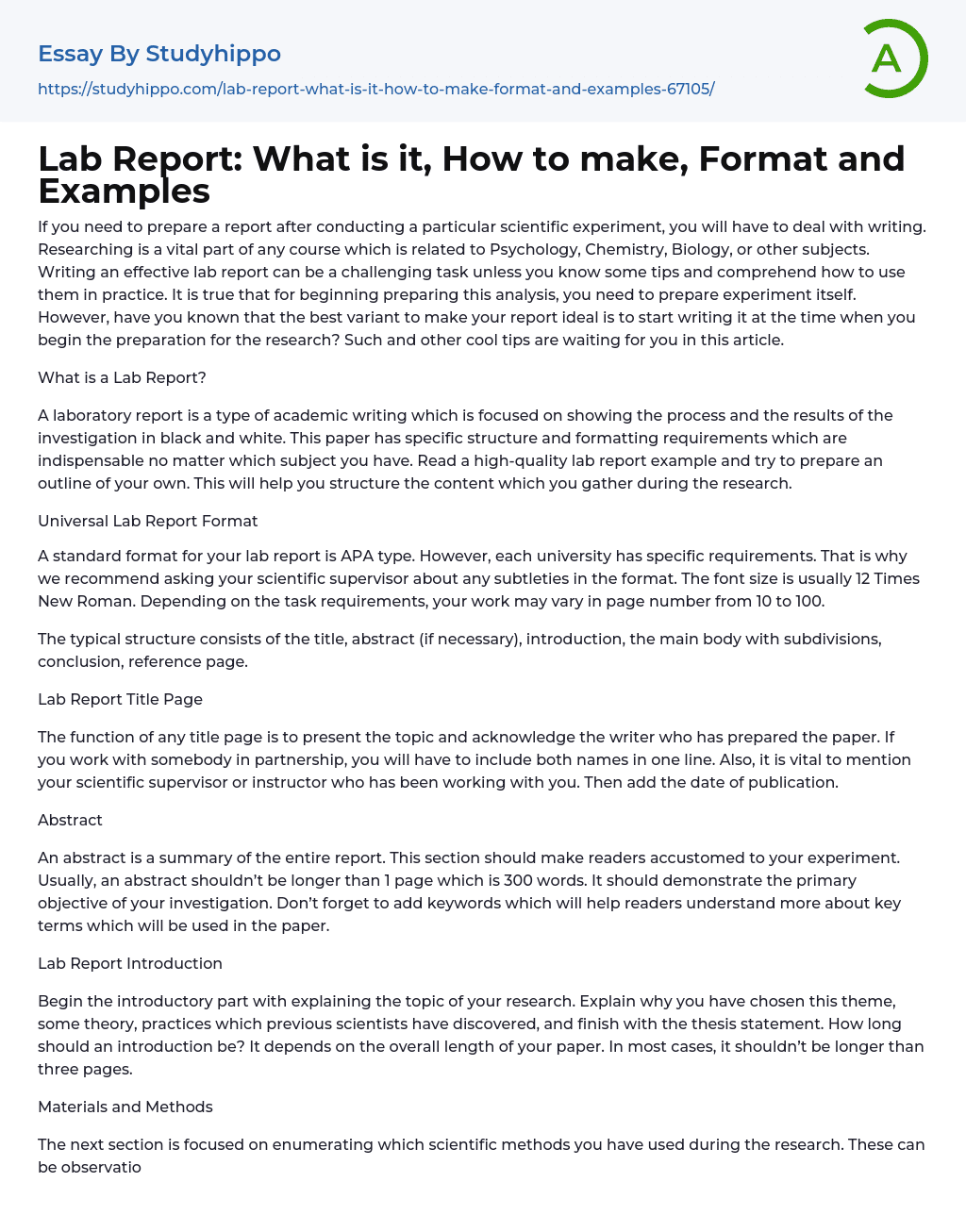

Lab Report: What is it, How to make, Format and Examples Essay Example
When writing a report based on a scientific experiment you conducted, it is crucial to pay attention to the writing task.
Researching is crucial in all fields of study, such as psychology, chemistry, biology, and others. Although writing an efficient lab report may pose difficulties, it becomes simpler with practice and following some tips. It is essential to start the report at the beginning of research preparation to ensure a more ideal outcome. Find additional useful advice in this article.
A lab report is a form of academic writing that presents the investigation process and findings clearly. Regardless of the subject, this paper must adhere to specific structure and formatting requirements. By reading a well-crafted lab report example, you can create an outline for your own report. This will assist in organizing the research content effectively.
Universal Lab Report
...
Format
A suggested format for your lab report is APA style. However, different universities have specific guidelines. It is recommended to consult your scientific supervisor for any specific formatting requirements. The font size is typically 12 Times New Roman. The length of your report may vary between 10 to 100 pages depending on the task requirements. The standard structure includes a title, abstract (if required), introduction, main body with subsections, conclusion, and reference page.
Title Page: Lab Report
The title page is used to introduce the topic and acknowledge the writer of the paper. If there was collaboration, include their name on the same line. Also mention your scientific supervisor or instructor, and don't forget to include the publication date.
Abstract
The abstract acts as a brief summary of the entire report.
The purpose of
View entire sample
Join StudyHippo to see entire essay
Format
A suggested format for your lab report is APA style. However, different universities have specific guidelines. It is recommended to consult your scientific supervisor for any specific formatting requirements. The font size is typically 12 Times New Roman. The length of your report may vary between 10 to 100 pages depending on the task requirements. The standard structure includes a title, abstract (if required), introduction, main body with subsections, conclusion, and reference page.
Title Page: Lab Report
The title page is used to introduce the topic and acknowledge the writer of the paper. If there was collaboration, include their name on the same line. Also mention your scientific supervisor or instructor, and don't forget to include the publication date.
Abstract
The abstract acts as a brief summary of the entire report.
The purpose of
this section is to provide an introduction to the experiment for the readers. The abstract should be brief and limited to one page or 300 words. It should emphasize the main goal of your investigation and incorporate keywords that will aid in understanding important terms used in the paper.
Introduction to the Lab Report:
Commence the introduction by providing an explanation of the subject matter of your research.
The reason for choosing this theme, along with relevant theory and previous scientific practices, will be explained in this section. It will conclude with the thesis statement. The length of the introduction depends on the overall length of the paper and should generally not exceed three pages.
Materials and Methods
The subsequent section will outline the scientific methods employed in the research, including observations, experiments, synthesis, analysis, and other relevant approaches.
When discussing materials, include only those that had the greatest impact on the investigation. All minor materials will be listed in the references.
Results and Discussion
Share with readers the data discovered through research. It is advisable to present the information in tables or other visual aids for better comprehension. While the results section focuses on presenting numerical data, this part aims to elucidate the methodology used to obtain these figures.
Show the calculations, interpretation of the results, analysis, and hypothesis, as this is where you present the details from your investigation.
Acknowledgments
This section is commonly linked to the conclusion. In the acknowledgment part, honestly discuss any difficulties or changes encountered during the experimental procedure. Share your thoughts on what was positive or negative.
This section is intended for those who want to further explore the topic addressed in the lab report.
Lab Report
Conclusion
In brief, the conclusion entails reflecting on whether the research was conducted effectively, referring back to the thesis statement. Additionally, any issues encountered or suggestions for improvement can be included in this section. As for its length, the conclusion should be approximately the same size as the introduction.
References
Enumerate all the materials and works you have used during the experiment. Make sure you adhere to the latest requirement of the necessary format.
- Academia essays
- Higher Education essays
- Language Learning essays
- Studying Business essays
- Education System essays
- Study essays
- First Day of School essays
- Scholarship essays
- Pedagogy essays
- Curriculum essays
- Coursework essays
- Studying Abroad essays
- Philosophy of Education essays
- Purpose of Education essays
- Brainstorming essays
- Educational Goals essays
- Importance Of College Education essays
- Brown V Board of Education essays
- The Importance Of Higher Education essays
- Online Education Vs Traditional Education essays
- Academic And Career Goals essays
- Academic Integrity essays
- Brown Vs Board Of Education essays
- Distance learning essays
- Technology in Education essays
- Vocabulary essays
- Writing Experience essays
- Importance of Education essays
- Early Childhood Education essays
- Academic Degree essays
- Academic Dishonesty essays
- School Uniform essays
- Academic writing essays
- Cheating essays
- Bachelor's Degree essays
- MBA essays
- College Life essays
- Grade essays
- Diploma essays
- Phonology essays
- Sentence essays
- Filipino Language essays
- Pragmatics essays
- Millennium Development Goals essays
- History Of Education essays
- Graduate School essays
- Middle School essays
- School essays
- Special Education essays
- University essays



